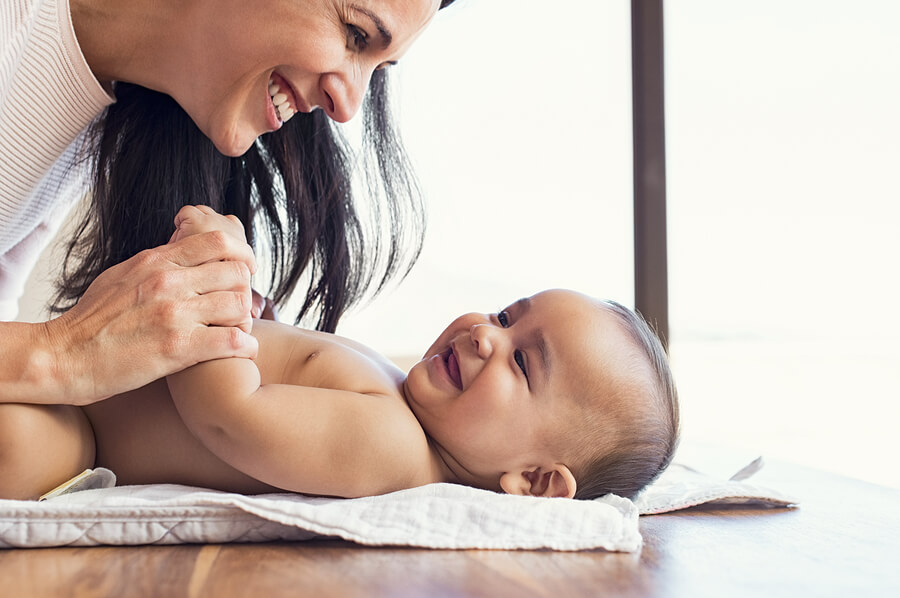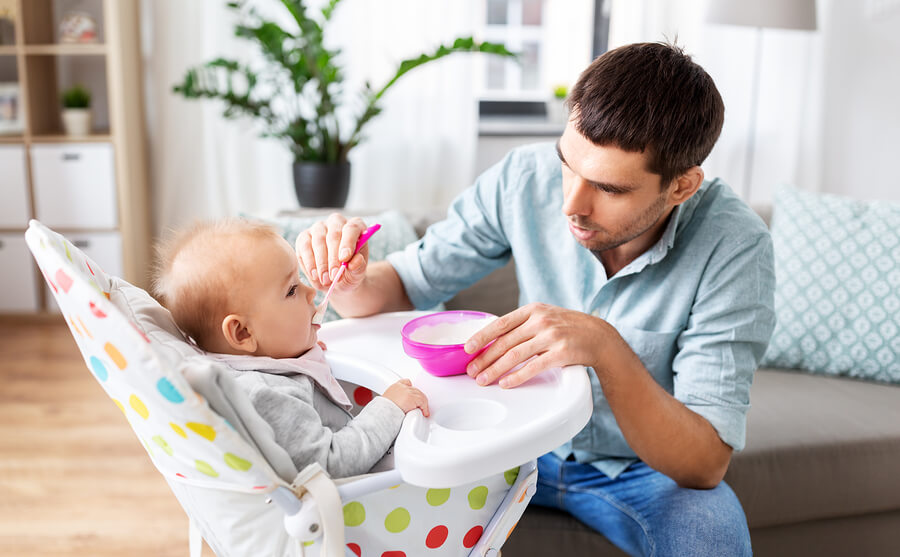Do Babies Recognize Emotions?


Written and verified by the psychologist Mara Amor López
Most parents believe that babies, at least before the age of 6 months, aren’t able to recognize the emotions of others, but they’re wrong. Newborns can distinguish them from the moment they leave their mother’s womb, although this perception is refined as they grow.
Babies have the ability to understand and comprehend almost immediately the sensations that other people convey through their faces and voices. I’m sure you’ve noticed that your little one smiles if they see you smile, but if they see you sad, they seem to look worried. Even if you’re stressed, they’ll be more irritable. This is because their only tool to communicate with those around them is to express emotions and understand the emotions they see in others.
In this article, we’ll tell you more, so keep reading!
How babies recognize emotions
According to a study conducted by psychologists and neurologists, the feeling that babies identify first is sadness. They discovered that between 3 and 7 months, they’re able to recognize this emotion and that they do so by recognizing the mother’s tone of voice. Therefore, a newborn baby’s sense of hearing is very important for understanding the world around them, which is why it’s one of the first senses to develop. Through the perception of different emotions, little ones begin to generate empathy.
Another study determined that babies, from 5 months of age, can “identify, differentiate, and compare different affective expressions of other children”. Therefore, they’re able to recognize where the cry comes from and if it’s from another child or from their sibling. In this work, the infants weren’t presented with the voices and images of the babies at the same time. That is, they recognized each other’s smiles just by looking at them, without the need to listen to them. Similarly, just by hearing them, and without seeing them, the babies smiled as well.
From a very early age, children learn to differentiate between laughing and crying. The sound of these emotions is different and, little by little, babies begin to grasp these differences so that after a few months, they’re able to distinguish them.

Babies recognize their parents’ emotions
Babies recognize and feel the emotions that are happening around them. Therefore, if you’re sad, they’ll notice it and be more irritable. In the same way, if they sense that you’re happy, they’ll be happy as well. How do the different moods of parents affect babies? Here’s how.
The emotions of their environment and parental stress
When we feel tired, stress rubs off on our little ones. This happens because when we have our minds occupied in different matters that worry us, we concentrate less on what our little one needs, so the baby can notice when the stress of their parents increases. With this, they can also experience loneliness and fear, which can cause insecurities that will be difficult to solve in the future.
Therefore, if we’re stressed, it’s important to try not to bring it into our private life. If necessary, it’s even a good idea to seek help to manage emotions and raise our little ones in the right way.
The importance of controlling emotions around your baby
All parents, even the nicest ones, have days or certain moments when they’re not feeling well emotionally. They may be tired from too many day-to-day tasks, or they may feel frustrated because something didn’t go the way they’d hoped it would. Although all these situations are normal and common to everyone, it’s important that we learn to fight those negative feelings that appear and do it in a healthy way.
We mustn’t forget that babies progress when there are positive and happy people around them. Therefore, it’s important to avoid those negative emotions that can harm our little ones. It can be helpful to take a break from your baby when you feel that you’re about to explode, and thus protect them from those negative emotions. For that, you can count on the help of your partner or another person you trust.

Activities to relax
To disconnect a little and avoid passing your anxiety to the baby, it can be very helpful to do some of the following activities:
- Meditate
- Take deep breaths
- Listen to relaxing music
- Take a bubble bath
- Call a friend to cheer you up
About babies recognizing emotions
You’ve already seen in this article that babies recognize emotions from a very early age. In addition, they’re able to express their emotions through their voice, posture, or facial expression from birth, to help caregivers identify what their mood is. This ability is important for them, as it’s the first tool they have to communicate with the people around them.
Therefore, you should take care of your emotions, as children are able to detect them. As we’ve said before, babies develop much better if they’re accompanied by positive and happy people. So, don’t forget to bring out your best smile to give to your little one.
Most parents believe that babies, at least before the age of 6 months, aren’t able to recognize the emotions of others, but they’re wrong. Newborns can distinguish them from the moment they leave their mother’s womb, although this perception is refined as they grow.
Babies have the ability to understand and comprehend almost immediately the sensations that other people convey through their faces and voices. I’m sure you’ve noticed that your little one smiles if they see you smile, but if they see you sad, they seem to look worried. Even if you’re stressed, they’ll be more irritable. This is because their only tool to communicate with those around them is to express emotions and understand the emotions they see in others.
In this article, we’ll tell you more, so keep reading!
How babies recognize emotions
According to a study conducted by psychologists and neurologists, the feeling that babies identify first is sadness. They discovered that between 3 and 7 months, they’re able to recognize this emotion and that they do so by recognizing the mother’s tone of voice. Therefore, a newborn baby’s sense of hearing is very important for understanding the world around them, which is why it’s one of the first senses to develop. Through the perception of different emotions, little ones begin to generate empathy.
Another study determined that babies, from 5 months of age, can “identify, differentiate, and compare different affective expressions of other children”. Therefore, they’re able to recognize where the cry comes from and if it’s from another child or from their sibling. In this work, the infants weren’t presented with the voices and images of the babies at the same time. That is, they recognized each other’s smiles just by looking at them, without the need to listen to them. Similarly, just by hearing them, and without seeing them, the babies smiled as well.
From a very early age, children learn to differentiate between laughing and crying. The sound of these emotions is different and, little by little, babies begin to grasp these differences so that after a few months, they’re able to distinguish them.

Babies recognize their parents’ emotions
Babies recognize and feel the emotions that are happening around them. Therefore, if you’re sad, they’ll notice it and be more irritable. In the same way, if they sense that you’re happy, they’ll be happy as well. How do the different moods of parents affect babies? Here’s how.
The emotions of their environment and parental stress
When we feel tired, stress rubs off on our little ones. This happens because when we have our minds occupied in different matters that worry us, we concentrate less on what our little one needs, so the baby can notice when the stress of their parents increases. With this, they can also experience loneliness and fear, which can cause insecurities that will be difficult to solve in the future.
Therefore, if we’re stressed, it’s important to try not to bring it into our private life. If necessary, it’s even a good idea to seek help to manage emotions and raise our little ones in the right way.
The importance of controlling emotions around your baby
All parents, even the nicest ones, have days or certain moments when they’re not feeling well emotionally. They may be tired from too many day-to-day tasks, or they may feel frustrated because something didn’t go the way they’d hoped it would. Although all these situations are normal and common to everyone, it’s important that we learn to fight those negative feelings that appear and do it in a healthy way.
We mustn’t forget that babies progress when there are positive and happy people around them. Therefore, it’s important to avoid those negative emotions that can harm our little ones. It can be helpful to take a break from your baby when you feel that you’re about to explode, and thus protect them from those negative emotions. For that, you can count on the help of your partner or another person you trust.

Activities to relax
To disconnect a little and avoid passing your anxiety to the baby, it can be very helpful to do some of the following activities:
- Meditate
- Take deep breaths
- Listen to relaxing music
- Take a bubble bath
- Call a friend to cheer you up
About babies recognizing emotions
You’ve already seen in this article that babies recognize emotions from a very early age. In addition, they’re able to express their emotions through their voice, posture, or facial expression from birth, to help caregivers identify what their mood is. This ability is important for them, as it’s the first tool they have to communicate with the people around them.
Therefore, you should take care of your emotions, as children are able to detect them. As we’ve said before, babies develop much better if they’re accompanied by positive and happy people. So, don’t forget to bring out your best smile to give to your little one.
All cited sources were thoroughly reviewed by our team to ensure their quality, reliability, currency, and validity. The bibliography of this article was considered reliable and of academic or scientific accuracy.
This text is provided for informational purposes only and does not replace consultation with a professional. If in doubt, consult your specialist.








